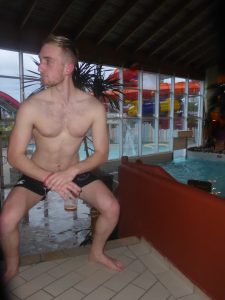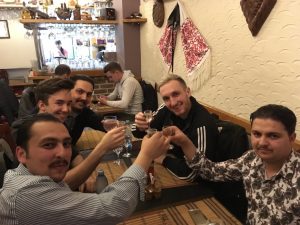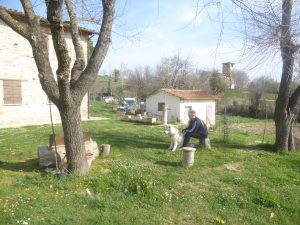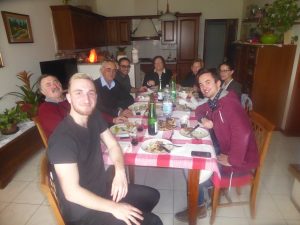One of the reasons I chose to come to Denmark was because DIS allowed me to create a class schedule unique to my particular academic interests. At the moment, I’m fascinated by old age and the struggles that it puts onto elderly individuals, especially in a culture where we tend to shuttle our old out of sight. One of my post-graduation goals is to develop a documentary film project focused on a cross-cultural exploration of old age in order to determine if there is any way to soften the difficulties associated with aging in our society. For my European Documentary Film class final project, I decided to do a sort of preliminary exploration into this topic. This work portrays my first experiences setting up interviews on my own, and looking back there is so much that I realize I could have done differently to improve the final product. That being said, I’m certainly proud of this piece and am excited to begin developing my next project. I would recommend watching it in 720p HD for the crispest image. Enjoy!
Monthly Archives: April 2017
Dwayne’s Family in Europe
In this blog post, I would like to compare and contrast two experiences that occurred while I was travelling with my friend Nick Horst during our programs independent travel break. Family, hospitality, immigration and “genuine” travel seem to be the common themes that connect these two events. I believe the best strategy for framing this post is to dive right into the stories, then finish with my own critical thoughts and analyses.
The first story takes place on a rainy afternoon in Brussels. We had only scheduled a single afternoon in the city, and we were using the internet in our hostel at 3pm trying to figure out the best way to spend our limited time. So far, a visit to the grand market with a waffle and beer was the only thing we had planned. While looking at a map of the Brussels suburbs, I noticed a small waterpark called Oceade that was open until 9pm. Although Nick was hesitant at first, I knew that we had to go.
Unlike American waterparks, Oceade had almost no staff or regulations. Nick and I jumped into the slides at the same time, rolling around while trying to do tricks with our inner tubes. I hadn’t felt such childish fun in a long time. After a few hours of reckless sliding, we headed to the sauna center where we met three large bellied, mustachioed Romanians.
Although they were all married with kids and looked middle aged, the oldest was only 24. They invited us to dinner at a Romanian restaurant in the city, an offer that Nick and I would never refuse. After getting dressed and greasing up our hair, we packed into their car and drove into the city. While driving, one of them started a facebook live and told Nick and I to pretend that we were in Los Angeles with them for their friends; needless to say it was simultaneously strange and hilarious.
What struck me most about these three Romanians was their commitment to family, hospitality and structure. All were married with kids, highly religious, worked six days a week and spent their weekend going to the same sauna and eating at the same restaurant with each other. Nick and I were the first guests that had joined this weekly ritual of theirs; apparently they had once invited some Canadians who had refused. They repeatedly told me the lengths they would go if their family (or Nick and I, their new lifelong friends) would go to if they were ever needed. 5 years, 10 years, 20 years down the road, Nick and I would always have a place to stay in Romania where food and money would be available if we needed it. There is no doubt that this sort of commitment to family is lacking in many American families; would you leave work and drive 200 miles if your uncle’s car had suddenly broken down? Moreover, they were offering us, strangers, the same hospitality they would offer their family members.
The second part of this story takes place in Umbria and Le Marche, two countryside provinces in central Italy about an hour from Rome. We travelled there to visit my extended family, a branch of my family tree connected solely by my grandfather’s mother who immigrated to Colorado from Pergola and married my great-grandfather, a Welsh coal miner. Nick and I spent two days in this beautiful area in an incredible farmhouse, and the hospitality that we experienced was unbelievable. I ate some of the best meals and wines of my life and felt re-connected to a side of my family that had really only interacted with my grandfather. Few spoke good English, so to communicate we had to find a middle ground of English and Italian. As such, the amount of Italian that I learned in such a short time was unbelievable. One of my proudest moments was having a fully Italian conversation over a cigarette with the oldest man of the household during a big family lunch.
There is no doubt that my experiences in Brussels and Italy were very similar; these are two cultures that live and breathe hospitality. As soon as Nick and I were recognized to be a part of their circle, there was nothing that they would not do for us. However, there was one crucial difference between the two that has been nagging in my mind; whether I was family blood or not. It has become very clear that the only reason Nick and I were welcomed in Italy is because I was part of their family. Often the family’s loud conversation revolved around exactly who I was related to and how (he is Carlo’s grandson, who is Nonna’s son, who is your cousin, etc.). I remember one man in particular who had freckles, brown hair and a red beard like I do. After I called him “mi familia”, he said jokingly, “let’s hope so, or else I would have to go get the gun”.
Moreover, although my experiences regarding my family were generally incredibly positive, there were moments of intense racism, sexism and homophobia. They are highly anti-immigrant and strongly believe that women should be below men. It seems clear to me that a lot of this sentiment stems from how closed off their community is. They have lived in the same small towns for generations and know almost everyone; of course they are not going to be welcoming to someone who looks different and does things differently. Like I mentioned above, the Romanians accepted Nick and I despite our foreign status. However, it is quite possible that they were so accepting because they were foreigners themselves; Romanians in Belgium separated from their homeland. Who knows how different our experience would have been if we were in their hometown sauna. Ultimately, these experiences reminded me just how inhospitable Americans and Danish people can be. There is so much that I can learn to do make my family, friends and strangers feel welcome while in my company.
-Dwayne




